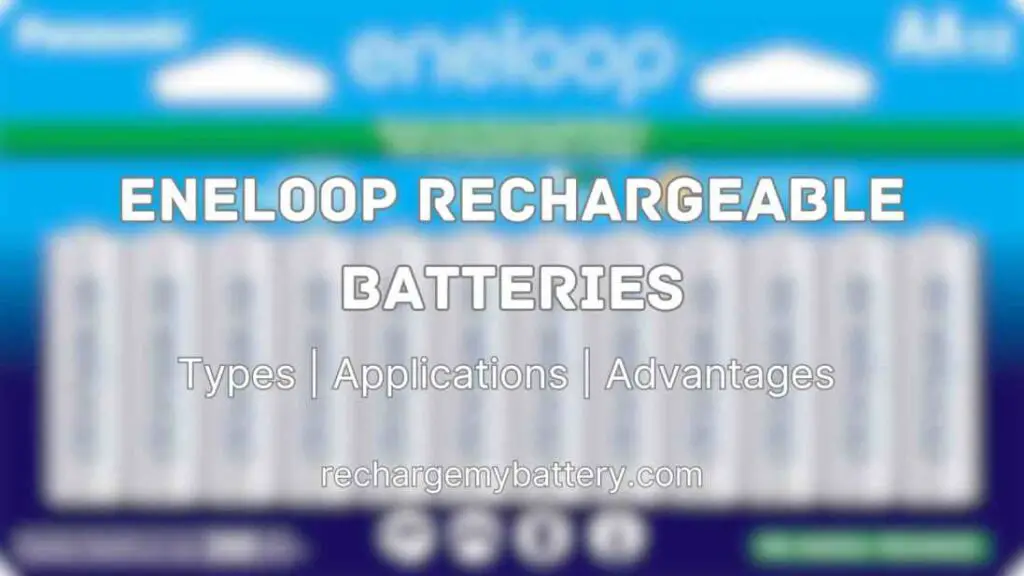In this article, we will explore the advantages, working mechanisms, benefits, applications, and tips for using Eneloop batteries, empowering you to make an informed choice for your energy needs.
What is Eneloop Rechargeable Batteries?
Eneloop batteries are a line of rechargeable batteries developed and manufactured by Panasonic. They are known for their exceptional performance, reliability, and long-lasting power. Eneloop batteries are available in various sizes, including AA, AAA, C, D, and 9V, making them compatible with a wide range of devices.
Advantages of Eneloop Batteries
Eneloop batteries offer several advantages over traditional disposable batteries. Firstly, they are rechargeable, which means you can use them repeatedly, reducing both waste and costs. Unlike regular rechargeable batteries, Eneloop batteries have a low self-discharge rate, which means they hold their charge for a longer duration when not in use. This makes them ideal for devices that are used sporadically or stored for extended periods.
Types of Eneloop Batteries
Eneloop batteries come in two main types:
1. Standard Eneloop – These batteries are designed for everyday devices such as remote controls, clocks, and flashlights. They offer a good balance between capacity and longevity.
2. Eneloop Pro – These batteries are suitable for high-drain devices that require a consistent and powerful energy source, such as digital cameras and gaming controllers.
How Do Eneloop Batteries Work?
Eneloop batteries operate on the principle of rechargeable battery chemistry. They utilize nickel-metal hydride (NiMH) technology, which offers a high energy density, excellent power output, and a reduced memory effect. When connected to a compatible charger, the batteries undergo a controlled charging process, storing electrical energy for later use.
Battery Chemistry
Eneloop batteries employ a unique combination of materials, including a positive electrode made of nickel oxyhydroxide and a negative electrode composed of hydrogen-absorbing alloy. These elements enable efficient energy conversion, resulting in a stable and consistent power supply.
Self-Discharge Rate
One of the standout features of Eneloop batteries is their low self-discharge rate. While traditional rechargeable batteries tend to lose their charge over time, Eneloop batteries retain up to 70% of their initial charge after ten years of storage. This means you can have reliable power whenever you need it, even after prolonged periods of inactivity.
Benefits of Using Eneloop Batteries
1. Cost Savings
Investing in Eneloop rechargeable batteries can lead to significant cost savings in the long term. Since they can be recharged hundreds of times, you won’t need to purchase disposable batteries frequently. Additionally, Eneloop batteries retain their capacity over multiple charge cycles, ensuring consistent performance and minimizing the need for replacements.
2. Environmental Impact
By switching to Eneloop batteries, you contribute to reducing the environmental impact caused by disposable batteries. Disposable batteries often end up in landfills, releasing harmful chemicals into the soil and water. Eneloop batteries, on the other hand, are recyclable and have a much lower carbon footprint, promoting sustainability and a cleaner future.
3. Longevity and Performance
Eneloop batteries are engineered to provide long-lasting power and reliable performance. With their low self-discharge rate and high energy density, they are ideal for devices that require consistent energy delivery. Whether you need to capture the perfect shot with your camera or enjoy uninterrupted gaming sessions, Eneloop batteries offer reliability you can count on.
Applications of Eneloop Batteries
1. Consumer Electronics
Eneloop batteries find extensive use in various consumer electronics. From TV remotes and wireless keyboards to portable speakers and electric shavers, Eneloop batteries provide a convenient and eco-friendly power source for a wide range of everyday devices.
2. Photography
For photographers, Eneloop batteries are a reliable choice. They offer consistent power output, allowing you to capture more shots without worrying about battery life. Eneloop batteries are compatible with popular camera brands and are particularly well-suited for flash units and external battery packs.
3. Toys and Gaming Devices
Eneloop batteries are perfect for powering toys and gaming devices. Whether it’s remote-controlled cars, game controllers, or interactive learning toys, Eneloop batteries provide a stable and long-lasting power supply, ensuring uninterrupted fun for kids and adults alike.
Tips for Using Eneloop Batteries
1. Proper Charging
To maximize the lifespan and performance of Eneloop batteries, it’s essential to use a compatible charger. Panasonic offers dedicated chargers that provide optimal charging currents and prevent overcharging. Avoid using chargers not designed for NiMH batteries, as they may cause damage or reduce battery capacity.
2. Storage and Maintenance
When storing Eneloop batteries, it’s advisable to keep them in a cool, dry place away from direct sunlight. Avoid exposing them to extreme temperatures, as it can affect their performance and longevity. Furthermore, it’s recommended to fully charge the batteries before long-term storage to maintain their capacity.
Conclusion
Eneloop rechargeable batteries offer a sustainable and cost-effective solution for powering your devices. With their low self-discharge rate, long-lasting performance, and compatibility with various applications, Eneloop batteries provide a reliable energy source while minimizing environmental impact.
Make the switch to Eneloop batteries and enjoy the benefits of long-term power and responsible energy consumption. Thank you for reading.
